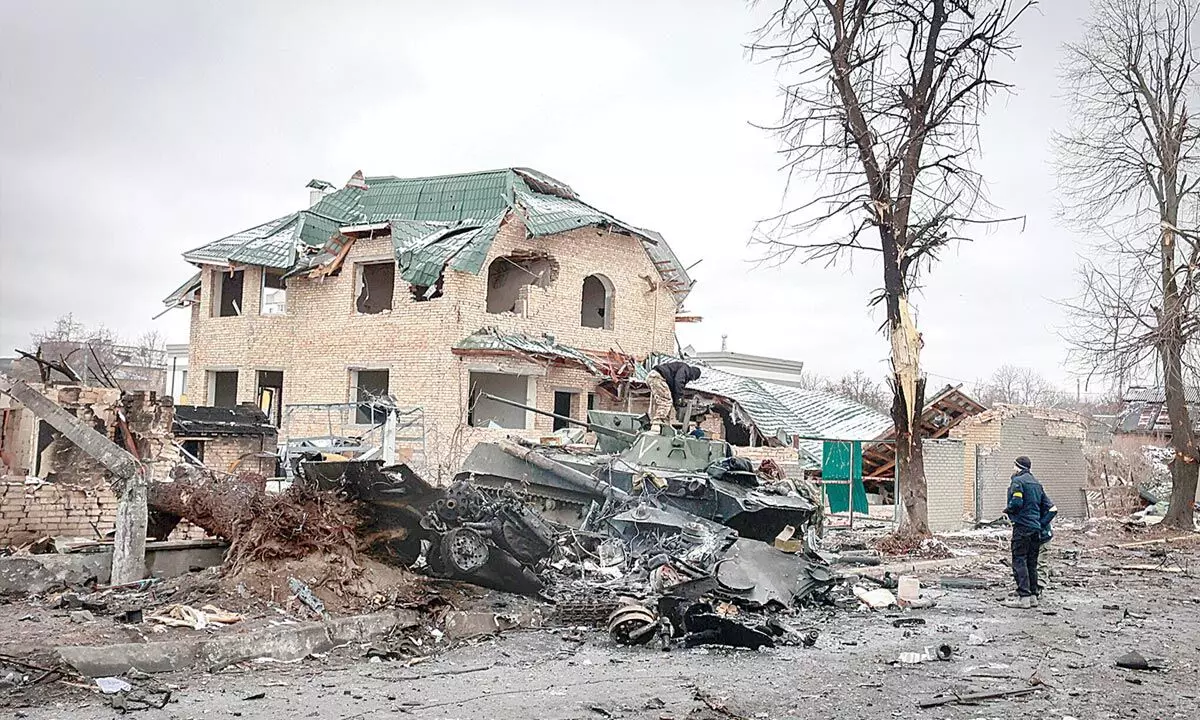Tourism, diplomacy keys for restoring normalcy in war-ravaged Ukraine
UNWTO calls upon all nations to shed conflicts and extend an olive branch
image for illustrative purpose

From the very start, the World Tourism Organization (UNWTO) has led tourism's response to the crisis. UNWTO commends tourism actors who provided them with means of transport, accommodation and other practical assistance. We also thank the countries hosting refugees until heading home is safe
This week saw a sad anniversary passing into the pages of history. It has been one year since Russia invaded Ukraine, in a clear breach of the United Nations Charter and international law.
The invasion has extracted a terrible price across sections and nations with Ukraine bearing the brunt.
Millions have been forced to flee their homes – right now around six million people, 65 per cent of them women and girls, are internally displaced. And the number of casualties keeps growing by the day, including civilian victims as homes and even hospitals are being indiscriminately targeted.
The invasion has also created a humanitarian and human rights catastrophe not seen in Europe since World War II.
Moreover, it has undermined the sense of security and trust we depend on to get the world moving again after the impact of the pandemic. From the very start, the World Tourism Organization (UNWTO) has led tourism's response to the crisis. It has moved swiftly to suspend Russia’s membership. At the same time, stakeholders from across the sector rallied in support of the Ukrainian people, eight million of whom have sought refuge across Europe. UNWTO commends tourism actors who provided them with means of transport, accommodation and other practical assistance. We also thank the countries hosting refugees until heading home is safe. With no end of the war in sight, our solidarity must remain rock-solid.
The first anniversary of the fateful day provides an opportunity to take stock of the events in the year gone by and introspect. The past year has shown us the remarkable strength of a people determined to hold onto their freedom and sovereignty. It has also shown us the importance of standing together, both as an international community and as a major economic sector, and staying true to our shared values, irrespective of the cost.
With each passing day, the show of unity and solidarity the global community has demonstrated since the invasion is also under attack, especially as countries everywhere continue to feel the economic fallout of the conflict and its social cost. That's explains why UNWTO will continue to amplify tourism's calls for peace and urge an immediate end to all hostilities. They will also be there when the war ends, as it surely will. Then, tourism's unique power, proven time and again, to win trust back, promote dialogue and understanding across borders, and provide opportunities, will be vital to help the people of Ukraine re-build the country for which they have already given so much.
Peace and mutual understanding are essential ingredients for recovery. Now is the time to work together, and for diplomacy instead of conflict in any part of the world. UNWTO won’t allow political tensions to turn into a man-made crisis as that will undermine collective progress.
Tourism is the main bridge for building a rapport and mutual understanding. It has the unique ability to promote peace between and among peoples everywhere.
UNWTO stands firmly with UN Secretary-General António Guterres in his call for all countries to settle disputes through peaceful means and not through conflict, and that they respect international security and justice at all times.
In keeping with the UN call, giving a voice to people of all regions, backgrounds and nationalities, UNWTO also believes that the spirit of international solidarity and shared values that define not just tourism but also common humanity will and should prevail. There is hope that diplomatic efforts to avoid conflict continue and succeed.
India has so far sought to meet three increasingly divergent objectives in response to the war: to preserve its strategic partnership with Russia in order to prevent Moscow from slipping ever deeper into Beijing’s orbit; to defend its long-standing principles of non-interference; and to protect itself from potential collateral damage resulting from Russia’s actions, such as western sanctions or retaliation from Russia if India were to actively oppose the invasion.
India drew increasingly closer to the US and other western countries because of China’s rise, as well as domestic pressures to reform the Indian economy. At the same time, Moscow did not wish to simply become Beijing’s junior partner, and so it maintained its cooperation with New Delhi as part of its portfolio of relationships.
Russia is facilitating a completely visa-free regime with about 11 countries to counter any effect on tourism. With six more, including India and Indonesia, we are looking to ease the conditions. However lifting restrictions on the issuance of electronic visas to about 70 countries, with the exception of unfriendly ones, in a simplified manner will be a challenge.

